WTIS Students "Turn Back the Sheets" for Endangered Sea Turtles
February 26, 2009
In November 2006, E.O. Wilson, a renowned biologist at Harvard University and Pulitzer Prize winner, gave an Ubben Lecture to an audience in Kresge Auditorium. His topic was Earth's steadily decreasing biodiversity. 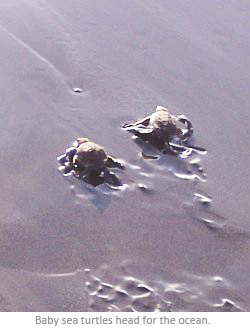 Scientists like Wilson have estimated that thousands of species go extinct every year as a result of human actions, a rate that would result in the loss of half of the planet's species during the next 100 years. Loss on such a large scale would negatively impact the development of medicines, health of ecosystems and global food crops for millions of years. Following his lecture, Wilson was asked what work an individual could do to make a difference. He answered, "Go to the hotspots," places in the world so densely populated with species that conservation efforts in those locations would be the most efficient.
Scientists like Wilson have estimated that thousands of species go extinct every year as a result of human actions, a rate that would result in the loss of half of the planet's species during the next 100 years. Loss on such a large scale would negatively impact the development of medicines, health of ecosystems and global food crops for millions of years. Following his lecture, Wilson was asked what work an individual could do to make a difference. He answered, "Go to the hotspots," places in the world so densely populated with species that conservation efforts in those locations would be the most efficient.
In the audience that night was Jeanette K. Pope, an associate professor of geosciences who is known for her zeal about environmental issues. Wilson's call to visit the so-called hotspots resonated with Pope. A few months later, she submitted a proposal for a Winter Term in Service (WTIS) trip to Costa Rica, a country that makes up just 0.1 percent of the world's landmass, but contains 5 percent of its species.
Last summer, Pope and project intern Missy Orr '09 traveled to Costa Rica to plan for the upcoming three-week WTIS, Pope's second in the Central American country. With a better understanding of the challenges her group would face, she and Orr prepared a trip that would make the most of their WTIS. 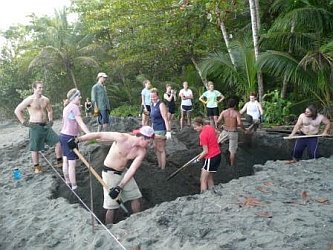 Their final itinerary included three service destinations that spanned the country from east to west, while their nights would be spent with host families near the work sites, immersing students in the culture.
Their final itinerary included three service destinations that spanned the country from east to west, while their nights would be spent with host families near the work sites, immersing students in the culture.
"I knew that it was going to be a wonderful opportunity to learn through doing," says Pope. "I think that we learn through challenges. They can be academic or social - it doesn't matter. How you respond to a situation teaches you a lot about yourself and your place in the world. Last year we did a reforestation project. It was muddy, there were mosquitoes, and it was hot. We were in these miserable conditions, but, after having done projects such as recycling campaigns, to actually plant a tree in the ground was personally moving."
The trip began in early January when Pope and Assistant Professor of Communication and Theatre Jennifer K. Adams accompanied the WTIS group to Gandoca, a town on the Caribbean Sea. Students spent a week preparing Gandoca's beach for the arrival of the sea turtles that nest there. A beach cluttered with washed-up logs and debris would present the enormous creatures with an insurmountable obstacle course. Unable to lay their eggs, the turtles would return to the sea in frustration. And even under perfect conditions, it's likely that unwatched eggs will be taken by local residents. 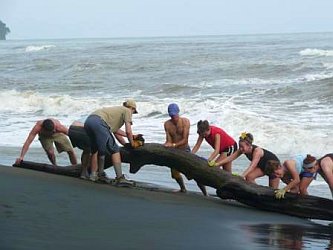 Although the practice is considered poaching, the eggs had long been a food source for people in the town. "If chicken eggs became illegal to eat, you can imagine how people would feel about that," says Pope, "but chickens aren't endangered." To reduce the chances of the eggs being stolen from their nests, students built a hatchery where they could be transferred for protection.
Although the practice is considered poaching, the eggs had long been a food source for people in the town. "If chicken eggs became illegal to eat, you can imagine how people would feel about that," says Pope, "but chickens aren't endangered." To reduce the chances of the eggs being stolen from their nests, students built a hatchery where they could be transferred for protection.
The group continued on to La Fortuna, a town at the base of Arenal Volcano in central Costa Rica and home to an educational farm for students from local schools. Plantations throughout Costa Rica typically grow bananas or pineapples in a monoculture, or a single large crop. Land that had once been rich with plant and animal species has been replaced by the efficiency-focused farming operations, which often lead to problems such as soil erosion and pollution from insecticides. The farm's owner - Don Juan, as he's known - has a different vision of farming. His property is host to 30 different crops, allowing him to be largely self-sufficient while retaining the biodiversity necessary to keep the land healthy. Students worked at his farm for more than a week, building tilapia ponds that will provide a source of protein for his future guests.
"For most of the trip, we were driving or walking through cloud forests, and wet and dry rainforests covered in plants on top of more plants," says Orr. 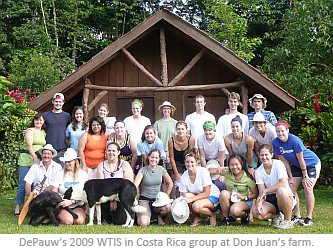 "As soon as we reached a plantation, everything was gone. Don Juan tries to plant a seed in the minds of school children of what farming can be like."
"As soon as we reached a plantation, everything was gone. Don Juan tries to plant a seed in the minds of school children of what farming can be like."
Orr also considered how similar the plantations were to the farms near her southern Indiana home. "Don Juan told us that he traveled to the United States and saw soybeans and corn being grown like pineapple and bananas. I've always lived next to a cornfield, but I never thought of it as a monoculture, or about the consequences that type of farming has."
From La Fortuna, the group traveled to Ostional on Costa Rica's Pacific coast. Similar to Gandoca, Ostional is a nesting area for sea turtles. Every year, hundreds of thousands of sea turtles emerge from the water onto a mile of beach in what is called the arribada, or arrival. This mass nesting practice has ensured the survival of the species that nest there, allowing enough of the relatively helpless babies to survive to continue the cycle.
During their nights in Ostional, students patrolled the beaches to mark and guard sea turtle nests, a fitting conclusion to a trip that began with similar work in Gandoca. Before they left the country, the group was rewarded with a few early arribada visitors: 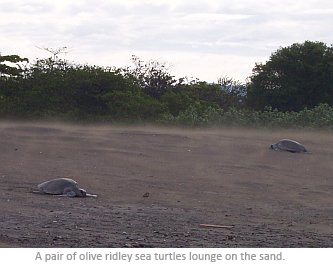 a few dozen olive ridley turtles, named for their green shells, and a single leatherback turtle, the largest of all sea turtles. Those in the group lucky enough to see the leatherback before she returned to the water - her flippers had been injured, and she was unable to dig a nest - witnessed one of the remaining 26,000-43,000 nesting females in the world.
a few dozen olive ridley turtles, named for their green shells, and a single leatherback turtle, the largest of all sea turtles. Those in the group lucky enough to see the leatherback before she returned to the water - her flippers had been injured, and she was unable to dig a nest - witnessed one of the remaining 26,000-43,000 nesting females in the world.
The DePauw students, Orr explained, formed relationships with the people in Costa Rica that never would have happened without the service component. "Our guide made the comment that we were really experiencing Costa Rica in a way that vacationers would never know. We weren't only seeing the beauty of the country, but also were given the opportunity to make hands-on, positive contributions to the local communities through the service we were able to do. Don Juan threw a surprise party with karaoke and dancing to show his appreciation for what we were doing and to express the importance of our efforts to him and his visitors. He told us that we were now part of his family. There were some tearful goodbyes because of the connections we were able to form."
